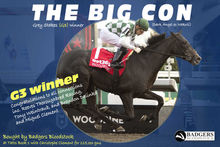Badger's musings...
- Grant Pritchard-Gordon
- Oct 20, 2019
- 4 min read
The word 'disconnected' has been widely used in recent political commentaries to highlight the fact that our Parliamentarians are out of sync with public opinion. The same thoughts on being 'disconnected' came to mind when mentally reviewing the past month of yearling and Horses in Training sales. I have come to the conclusion that many buyers at Park Paddocks conveniently leave their brains in the car park and studiously avoid the multitude of facts and statistics that abound to give guidance as to where to find value in the sales ring.

For some buyers, the problems start with their diary dates. While there are some breeders and pinhookers that focus on the Tattersalls Book 2 or 3 catalogues, there is absolutely no doubt that the large majority of the best stock are in Tattersalls Book 1. While the 2019 average of 258,000 Guineas and median of 150,000 Guineas might frighten many potential investors, it is our experience that this is the very best sale for getting bargains. To highlight the fact, consider that record-breaking trainer Mark Johnston bought fourteen lots for an average of 85,000 Guineas and only one of these was for more than the sale average. Quite apart from value, there is also the £25,000 sale bonus if your yearling wins a qualifying race. Two of our own agency purchases were for less than 30,000 Guineas, so a qualifying win will have the purchase price back straightaway.
With training fees continuing to rise, but prizemoney remaining static, many buyers favour the idea of buying a precocious sort that can hopefully win in the early part of a two year old campaign. Yes, that may provide more immediate owner satisfaction, but it does not help the overall financial considerations. Both training fees and capital expenditure have to be considered. An exit strategy is essential for any venture into racing and this entails making a plan to maximise/minimise any possible capital revaluations at the end of the envisaged training period. I suspect that this is far from any prospective owners thoughts when he enters Tattersalls to buy his future champion. However, a prior visit to the Tattersalls Horses in Training sales highlights the indisputable fact that winning horses with proven stamina are more likely to make higher prices than the sprinting equivalent. Markets such as Australia, Hong Kong, America and our own jumping market are opened up with proven ability to stay at least a mile. Achievable prices are accordingly much higher.
There has always been a magnetic fascination for trainers to want to buy first season sires. If the accepted figure that only One in Twenty stallions becomes successful, why would you put so much faith in finding that stallion? Yes, there is a small chance that you might buy a yearling from the next Galileo. However, is such a premium for first season sires justifiable? Why not do some solid research and focus on progeny of a proven stallion? There are several stallions that get a large number of winners, but fall just short of super-star status. Often their progeny are over-looked in the sale ring.
Being aware of any marketing strategy that might improve the earning capacity of any yearling purchase can be valuable. Plus Ten is being phased out, but an even more rewarding scheme for British bred fillies has been mooted. Similarly French bred horses and NHMOPS qualifiers have added appeal. Sales bonuses and even stallion bonuses need researching, as well as qualification for various sales races. Every little helps.
Prior familiarisation with a yearling catalogue can provide hours of entertainment. In depth research into results of stallions, broodmares, close relations, pedigree nicks and (importantly) breeders/vendors records can greatly improve the chances of buying a decent racehorse. The whole procedure of buying yearlings is a 'sifting' process. There are no shortcuts. Deskwork is advisable. Legwork on seeing as many yearlings as possible is essential, with those that stay on the list being seen a few times more. Vetting of selections can be an expensive luxury, but should certainly not be discarded without careful consideration.
Valuing a horse before it goes into the ring is essential, as is sticking to a pre-considered budget. The adrenalin-fuelled action of bidding for a horse has seen many a prospective purchaser bid far more than intended. Believe me, there is nothing worse than 'Buyer's Remorse' when awakening the day after the sale to consider in the cold light of day the damage that has been done to a bank balance in the sales ring yesterday. Importantly, be aware before the sale of any additional costs that will add to that sick feeling of seeing the invoice for your new purchase. Sales commission from the auction house, VAT, vetting and perhaps agent's commission must always be built in to the budget.
Most importantly, attending a yearling sale must not be considered in the same way as a day's shooting, where a blank result is considered disappointing. There will be many more sales to find that purchase that ticks all of the required boxes. Patience and persistence are often well rewarded in the sales ring, while a "whim" purchase is likely to end up as an expensive memory. Stick with the plan. Get good advice.



























Comments